现在完成时讲解(经典)
现在完成时讲解(完整版)(共17张PPT)
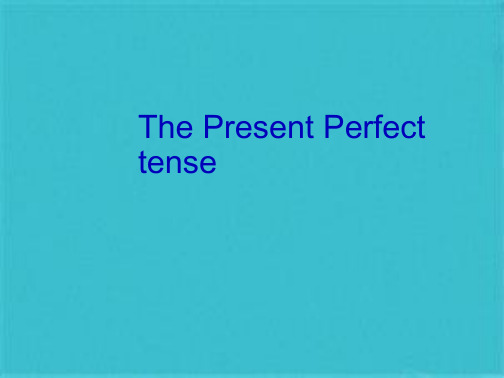
4. My friends haven’t visited me ___s_in_c_efew days ago.
5. We haven’t used our car _____faorlong time .
I have planted all the trees. 注:主语假设是第三人称单数助动词用 has
finished 9. goes 10. have, found 11. is He’ll be back soon.
Where’s Li Ming ? He __________ (go) to the teacher’s office.
否认形式 haven’t ( have not 〕 +过去分词 I ________ (see) it last week.
Where’s Li Ming ? He __________ (go) to the teacher’s office.
hasn’t ( has not ) +过去分词 have, stayed 8.
have, finished
have, stayed
• 1. have, seen, saw 2. Has, finished 3. has, —Yes, I ___________ New York twice.
You have planted all the trees. since: (自…以来)
6. She hasn’t had a good cup of coffee _____yefaorrs.
7. Tom has worn glasses _______he was 7 years old. since
现在完成时的用法详解英语

• Is your father in ?
•
No, heha__s_g__o_n__e__t_o___ to Shenzhen.
•
H__a__s___he everb_e_e__n__ there before ?
•
Yes, heh_a_s__b_e__e_n_____ there several times
ago.
A. Did…copy…did
B. Have…copied…have
C. Have…copied…did D. Did …copy…had
5. “Why _A_____ she _______ angry ?”
“Because he _____ at her just now .”
A. did…get…shouted B. has…got…shouted
A. Have…gone to B. Have…gone in
C. Have…been to D. Have …been in
3. My brother _C___college for over three years.
A. has gone to B. has been to C. has been at
但是不能和表示一段时间的状语连用。
短暂性动词变延续性动词:
• join --- be in / a
2) comeb-e-- in / at
• 3) borrow ---keep 4) buy -h-a-ve
5) arrive ---be
6) leave b--e- away (from)
7) begin --b- e on
• It has been colds_in__c_e__ two weeks ago.
英语语法-现在完成时讲解
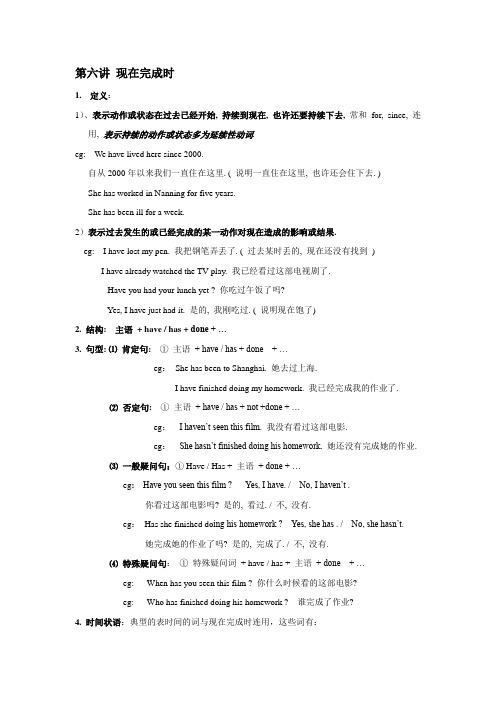
第六讲现在完成时1.定义:1)、表示动作或状态在过去已经开始, 持续到现在, 也许还要持续下去,常和for, since, 连用, 表示持续的动作或状态多为延续性动词.eg: We have lived here since 2000.自从2000年以来我们一直住在这里. ( 说明一直住在这里, 也许还会住下去. )She has worked in Nanning for five years.She has been ill for a week.2)表示过去发生的或已经完成的某一动作对现在造成的影响或结果.eg: I have lost my pen. 我把钢笔弄丢了. ( 过去某时丢的, 现在还没有找到)I have already watched the TV play. 我已经看过这部电视剧了.--- Have you had your lunch yet ? 你吃过午饭了吗?--- Yes, I have just had it. 是的, 我刚吃过. ( 说明现在饱了)2. 结构: 主语+ have / has + done + …3. 句型: ⑴肯定句: ①主语+ have / has + done + …eg:She has been to Shanghai. 她去过上海.I have finished doing my homework. 我已经完成我的作业了.⑵否定句: ①主语+ have / has + not +done + …eg:I haven’t seen this film. 我没有看过这部电影.eg:She hasn’t finished doing his homework. 她还没有完成她的作业.⑶一般疑问句:① Have / Has + 主语+ done + …eg: Have you seen this film ? Yes, I have. / No, I haven’t .你看过这部电影吗? 是的, 看过. / 不, 没有.eg:Has she finished do ing his homework ? Yes, she has . / No, she hasn’t.她完成她的作业了吗? 是的, 完成了. / 不, 没有.⑷特殊疑问句:①特殊疑问词+ have / has + 主语+ done + …eg: When has you seen this film ? 你什么时候看的这部电影?eg: Who has finished doing his homework ? 谁完成了作业?4. 时间状语:典型的表时间的词与现在完成时连用,这些词有:for 、since、already、yet、ever、never、recently、just、before、so far、by now、once ,twice…等连用.注意: for+一段时间since+过去的某一个时间点I have lived in Nanning for ten years.I have lived in Nanning since ten years ago/ 2002.I haven’t seen him for 15 years .I have never seen him since 1998.already :用于肯定句, 可放在助动词之后、过去分词之前,也可放在句末.I have already finished my homework.yet: 用在疑问句中意为”已经”, 用在否定句中表示”还”, 常放在句末.Have you finished your homework yet?I haven’t finished my homework yet.ever: 曾经用于疑问句中:Have you ever been to Beijing?Have you ever been to Shanghai ? 你去过上海吗?never: 未曾从未I have never traveled by plane before. 我以前从来没有乘飞机旅行过.recently:最近用于肯定否定疑问句中I have been busy recently.We have not seen Tom recently.Have they been here recently.eg: I have just seen Tom.I haven’t heard of it before. 我以前从来没有听说过这件事.They have planted 2000 trees so far.The child has learned 100 English words by now.5. 当与一段时间连用时, 经常用for 加一段时间, 这时候谓语动词一定要用延续性的.非延续性动词----延续性动词改错:They have got married for ten years. I have borrowed this book for a week.get married--- be married borrow --- keepcome ---- be here go --- be away / off buy --- havestart / begin --- be on leave --- be away die --- be deadarrive---be in/at join---be in /be a member of stop---be overreturn----be back open/close---be closed/openeg: He came here three days ago. 他三天前来的这. (一般过去时)He has been here for three days. 他来这已经三天了.(现在完成时与一段时间连用, 非延续性动词变延续性动词. )He went to Dalian last week. 他上周去的大连. ( 一般过去时)He has been away for a week. 他已经离开有一周了. ( 现在完成时)I bought the book last month. 我去年买的这本书. ( 一般过去时)I have had the book for a month. 我保管这本书有一周了. ( 现在完成时)The football match started an hour ago.The football match has been on for an hour.7. 现在完成时与一般过去时的区别:1)、侧重点不用,现在完成时是与现在有关的时态,侧重于过去的动作对现在造成影响,而一般过去时是一种过去的时态,侧重于表示过去的动作,与现在无关。
现在完成时讲解

现在完成时讲解LEKIBM standardization office【IBM5AB- LEKIBMK08- LEKIBM2C】现在完成时讲解一.基本结构:助动词have/has+过去分词(done)二.句型:否定句:主语+have/has+not+过去分词+其他. 一般疑问句:Have/Has+主语+过去分词+其他. 简略答语: Yes, 主语 + have/has.(肯定) No, 主语 + haven't/hasn't.(否定)三.用法(1)现在完成时表示过去发生或已经完成的动作对现在造成的影响或结果I have spent all of my money (so far).(含义是:现在我没有钱花了.)Guo zijun has (just/already) come. (含义:郭子君现在在这儿)My father has gone to work.(含义是:我爸爸现在不在这儿)(2)现在完成时可以用来表示发生在过去某一时刻的,持续到现在的动作(用行为动词表示)或状态(be动词表示)常与for(+时间段),since(+时间点或过去时的句子)连用.①for+时段②since+过去一个时间点(译为:自从……以来)③since+时段+ago④since+从句(过去时)⑤It is+时段+since+从句(过去时)Mary has been ill for three days.I have lived here since 1998.四.has gone (to),has been (to), has been (in) 的区别Have/Has gone(to) :去了(现在不在说话现场)Where is your father?He has gone to Shanghai.Have/Has been (to) :去过(已不在去过的地方)My father has been to Shanghai.Have/has been in:呆了多久(还在所呆的地方)My father has been in Shanghai for two months. /since two months ago.五.现在完成时的标志1.现在完成时的含义之一是过去完成的动作对现在仍有影响,用以下四大标志词可以表达这种含义:* 以already, just和yet为标志He has already got her help.他已得到她的帮助。
初中现在完成时讲解ppt

since
for
since
for
since
练习题: 1.It's a long time since we ____ (meet) last, isn't it? 2.--I know you ___________ (choose) a picture book among these. --Yes,Have a look at it, please. 3.So far, spaceships without people ___________ (reach) the moon and some other parts of the universe. 4.My father____ home for nearly three weeks. A.has gone away from B.has left C.has been away from D.went away 5.Mr. and Mrs. Green have_____in China for a week. A.been B.got C.arrived D.reached
eg.--- I’ve lived here for 15 years. eg.--- I’ve lived here since 15 years ago(1990)
选用for和since填空: 1.We haven’t seen each other ______ a long time. 2.His father has been in the factory ______ 10 years ago. 3.The film has been on ______ 20 minutes. 4.Mr Green has worked here ______ he came to China. 5.His grandparents have been dead ______ several years. 6. It’s five years _______ we met last time
现在完成时的用法讲解
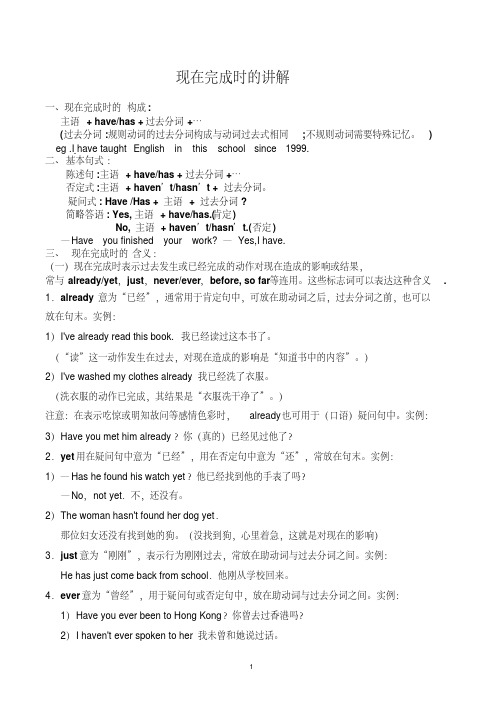
现在完成时的讲解一、现在完成时的构成:主语+ have/has + 过去分词+…(过去分词:规则动词的过去分词构成与动词过去式相同;不规则动词需要特殊记忆。
) eg .I have taught English in this school since 1999.二、基本句式:陈述句:主语+ have/has + 过去分词+…否定式:主语+ haven’t/hasn’t + 过去分词。
疑问式: Have /Has + 主语+ 过去分词?简略答语: Yes, 主语+ have/has.(肯定)No, 主语+ haven’t/hasn’t.(否定)—Have you finished your work? —Yes,I have.三、现在完成时的含义:(一)现在完成时表示过去发生或已经完成的动作对现在造成的影响或结果,常与already/yet,just,never/ever,before, so far等连用。
这些标志词可以表达这种含义. 1.already意为“已经”,通常用于肯定句中,可放在助动词之后,过去分词之前,也可以放在句末。
实例:1)I've already read this book. 我已经读过这本书了。
(“读”这一动作发生在过去,对现在造成的影响是“知道书中的内容”。
)2)I've washed my clothes already.我已经洗了衣服。
(洗衣服的动作已完成,其结果是“衣服冼干净了”。
)注意:在表示吃惊或明知故问等感情色彩时,already也可用于(口语)疑问句中。
实例:3)Have you met him already ?你(真的)已经见过他了?2.yet用在疑问句中意为“已经”,用在否定句中意为“还”,常放在句末。
实例:1)—Has he found his watch yet ?他已经找到他的手表了吗?—No,not yet.不,还没有。
2)The woman hasn't found her dog yet .那位妇女还没有找到她的狗。
(完整版)现在完成时讲解(含讲解及习题)(可编辑修改word版)
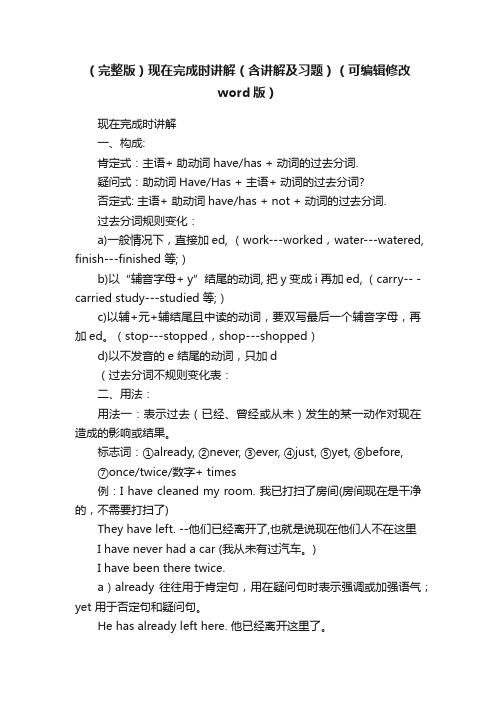
(完整版)现在完成时讲解(含讲解及习题)(可编辑修改word版)现在完成时讲解一、构成:肯定式:主语+ 助动词have/has + 动词的过去分词.疑问式:助动词Have/Has + 主语+ 动词的过去分词?否定式: 主语+ 助动词have/has + not + 动词的过去分词.过去分词规则变化:a)一般情况下,直接加ed, (work---worked,water---watered, finish---finished 等;)b)以“辅音字母+ y”结尾的动词, 把y 变成i 再加ed, (carry-- -carried study---studied 等;)c)以辅+元+辅结尾且中读的动词,要双写最后一个辅音字母,再加ed。
(stop---stopped,shop---shopped)d)以不发音的e 结尾的动词,只加d(过去分词不规则变化表:二、用法:用法一:表示过去(已经、曾经或从未)发生的某一动作对现在造成的影响或结果。
标志词:①already, ②never, ③ever, ④just, ⑤yet, ⑥before,⑦once/twice/数字+ times例:I have cleaned my room. 我已打扫了房间(房间现在是干净的,不需要打扫了)They have left. --他们已经离开了,也就是说现在他们人不在这里I have never had a car (我从未有过汽车。
)I have been there twice.a)already 往往用于肯定句,用在疑问句时表示强调或加强语气;yet 用于否定句和疑问句。
He has already left here. 他已经离开这里了。
Has he already left here? 他(真的)已经离开这里了吗?(表示加强语气)My teachers haven’t had breakfast yet. 我的老师们还没有吃早饭。
初中英语现在完成时讲解全(共24张PPT)

I studied English ten years ago.
(come来到某地….
left the team
has been on C.
表示动作发生在过去,对现在造成的影响。
)
be over
went to bed
填空使用for和since
Tom ___for several hours.
表示动作发生在过去,对现在造成的影响。
• She has lived here ______1996.
• 2 标准词:so far/up to now (到目前为止) ;lately/recently(最近)
• Up to now/So far ,I haven’t been successful.
• Lately/Recently,I haven’t seen my teacher.
3. He bought the motorbike a month ago.
---He ____ ____ the motorbike for a month. 4. He arrived here three days ago.
--- He ____ ____ here since three days ago. 5. They turned off the light 2 hours ago.
(finish结束....)
be over
1.我买这本书三年了。Buy I have bought the book.
(1) I have had the book for 3 years. (2) I have had the book since 3 years ago.
了borrow He has borrow the book. (1)He has kept the book for 2 months . (2) He has kept the book since 2 months ago.
现在完成时讲解(详细、简单)
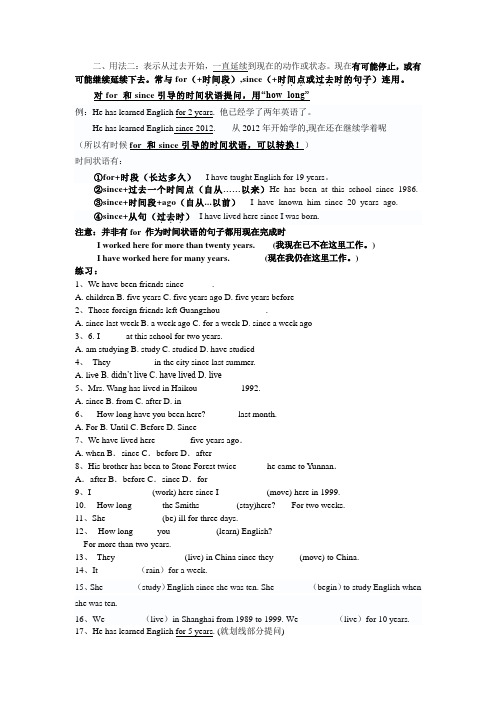
二、用法二:表示从过去开始,一直延续到现在的动作或状态。
现在有可能停止,或有可能继续延续下去。
常与for(+时间段...或过去时的句子......)连用。
...),since(+时间点对for 和since引导的时间状语提问,用“how long”例:He has learned English for 2 years. 他已经学了两年英语了。
He has learned English since 2012. -从2012年开始学的,现在还在继续学着呢(所以有时候for 和since引导的时间状语,可以转换!)时间状语有:①for+时段(长达多久)I have taught English for 19 years。
②since+过去一个时间点(自从……以来)He has been at this school since 1986.③since+时间段+ago(自从...以前)I have known him since 20 years ago.④since+从句(过去时...)I have lived here since I was born.注意:并非有for 作为时间状语的句子都用现在完成时I worked here for more than twenty years. (我现在已不在这里工作。
)I have worked here for many years.(现在我仍在这里工作。
)练习:1、We have been friends since ______.A. childrenB. five yearsC. five years agoD. five years before2、Those foreign friends left Guangzhou __________.A. since last weekB. a week agoC. for a weekD. since a week ago3、6. I _____ at this school for two years.A. am studyingB. studyC. studiedD. have studied4、They _________ in the city since last summer.A. liv eB. didn’t liveC. have livedD. live5、Mrs. Wang has lived in Haikou _________ 1992.A. sinceB. fromC. afterD. in6、---How long have you been here? --- ____ last month.A. ForB. UntilC. BeforeD. Since7、We have lived here _______ five years ago.A. when B.since C.before D.after8、His brother has been to Stone Forest twice ______ he came to Yunnan.A.after B.before C.since D.for9、I _____________ (work) here since I __________ (move) here in 1999.10. ---How long ______ the Smiths ________(stay)here? ---- For two weeks.11、She ____________ (be) ill for three days.12、--How long _____you __________(learn) English?---For more than two years.13、They _______________ (live) in China since they _____ (move) to China.14、It _______(rain)for a week.15、She _______(study)English since she was ten. She _______(begin)to study English when she was ten.16、We _______(live)in Shanghai from 1989 to 1999. We _______(live)for 10 years.17、He has learned English for 5 years. (就划线部分提问)________ ________ ________ _________ learned English ?18、We began to learn English three years ago.(改为同义句)We _______ _______ English ________ three years19、He has lived here since 1999.(就划线部分提问)_____ _____ _____ he_______ here?20、Mr. Li began to teach English in this school in 1999.(同义句)Mr. Li _______ _________ English in this school since 1999.21、The factory opened ten years ago.(同义句)The factory _______ ________ ______ for ten years.22、His company closed in 2003. (同义句)His company _____ _____ _____ _____ 2003.23、We got to know each other for about 15 years. (同义句)We _______ ________ each other _____ about 15 years.三、注意:在现在完成时中与for 和since引导的时间状语,how long连用的动词必须为延续性动词。
现在完成时讲解
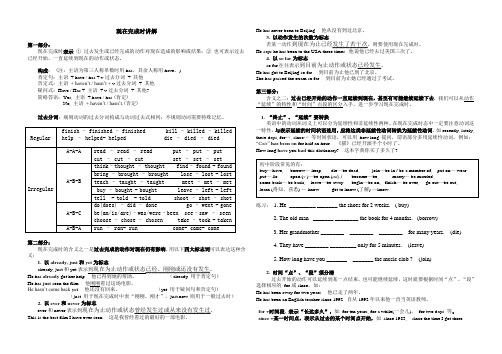
现在完成时讲解第一部分:现在完成时表示①过去发生或已经完成的动作对现在造成的影响或结果;②也可表示过去已经开始,一直延续到现在的动作或状态。
构成:(注:主语为第三人称单数时用has,其余人称用have。
)肯定句:主语+ have / has + v.过去分词+ 其他否定式:主语+ haven’t / hasn’t + v.过去分词+ 其他疑问式:Have / Has + 主语+ v.过去分词+ 其他?简略答语:Yes, 主语+ have / has.(肯定)No, 主语+ haven’t / hasn’t.(否定)过去分词:规则动词的过去分词构成与动词过去式相同;不规则动词需要特殊记忆。
第二部分:现在完成时的含义之一是过去完成的动作对现在仍有影响,用以下四大标志词可以表达这种含义:1. 以already, just和yet为标志already, just和yet表示到现在为止动作或状态已经、刚刚或还没有发生。
He has already got her help.他已得到她的帮助。
(already 用于肯定句)He has just seen the film.他刚刚看过这场电影。
He hasn’t come back yet.他还没有回来。
(yet 用于疑问句和否定句)(just 用于现在完成时中表“刚刚、刚才”,just now 则用于一般过去时)2. 以ever和never为标志ever和never表示到现在为止动作或状态曾经发生过或从来没有发生过。
This is the best film I have ever seen.这是我曾经看过的最好的一部电影。
He has never been to Beijing.他从没有到过北京。
3. 以动作发生的次数为标志若某一动作到现在为止已经发生了若干次,则要使用现在完成时。
He says he has been to the USA three times. 他说他已经去过美国三次了。
初中英语语法现在完成时精讲PPT

since and for
The woman has worked at this school for 2 years.( since two years ago)
4. 现在完成时常常与表示频度的时间状语 连用,如often, sometimes, ever, never, twice, on several occasion等:
Have you ever been to Beijing? I have never heard of Bunny. I have used this pen only three times. George has met that gentleman on several occasions.
__f_o_r __two days
__s_in_c_e__1997
__si_n_ce__yesterday
__fo_r___two weeks
afternoon
___s_in_c_e _three years
__si_n_ce__I came here ago
__si_n_ce__last Sunday __s_in_c_e__ last month
for + 时间段 for 2 years/a long time
since+时间点 since 2 years ago
since 1998 since she came to the school)
一、用for和since填空。
现在完成时讲解

现在完成时一、现在完成时的构成: 1. 现在完成时由助动词"have/has+动词的过去分词"构成。
若主语为三人称单数,则用"has+过去分词";若主语为非单三,则用"have+过去分词"。
have, has在名词或代词后的缩写为"'ve"和"'s"。
如:I have=I've, she has=she's;have not和has not的缩写形式分别是haven't, hasn't。
2. 现以动词wait为例,列表说明现在完成时的构成。
二、现在完成时的用法: (1)表示动作已经完成,但后果或影响仍在。
常与already, just, yet等副词连用。
Twenty people have already left.二十人已经离职。
He has not come yet. 他还没有来。
They've just arrived. 他们刚刚到达。
(2)表示过去发生的动作一直持续到现在。
常与for或since引导的一段时间状语连用。
He has lived here for three years.他在此住了三年了。
I have been here since 1976.自从1976年我就一直在这里。
三、现在完成时与一般过去时的区别: 现在完成时与一般过去时都表示"动作已经发生",但不同点在于: (1)现在完成时强调这一动作与现在的关系,即对现在产生的结果、影响等,而一般过去时只表示过去的事实,不表示和现在的关系。
He has learned French for three years.他学法语已三年了。
He learned French for three years.他曾学过三年法语。
Who has taken my bag? I cound't find it. 谁拿走了我的包?我找不着了! He cleaned the house yesterday. 他昨天打扫过房间。
现在完成时 语法讲解

现在完成时(一)定义:表示到现在为止发生过的动作或状态,也可表示过去已经开始,一直延续到现在的动作或状态;强调过去与现在之间的联系。
(二)构成(即谓语动词形式):助动词have/has+P.P.(过去分词)当主语是第三人称单数时,由has+过去分词构成;当主语是非三人称单数时,由have+过去分词构成。
例如:I have been to Beijing three times. (主语是非三人称单数)He has been to Beijing three times. (主语是三人称单数)(三)句型转换1、否定句:助动词have/has+not+ P.P.(过去分词)构成分别缩写为:haven’t+ P.P.或hasn’t+ P.P.例如:I haven’t been to Beijing three times.He hasn’t been to Beijing three times.2、一般疑问句:Have/Has+主语+ P.P.(过去分词)+其他成分?肯定回答:Yse, ~have/has. 否定回答:No, ~haven’t/hasn’t.例如:Have you been to Beijing three times?Yes, I have. / No, I haven’t.Has he been to Beijing three times?Yes, he has. / No, he hasn’t.(四)基本用法1、过去发生或已完成的某个动作对现在产生的影响或结果,强调的是这个影响或结果。
<又叫“完成用法”>常同already, just, yet等时间状语连用例如:I have just turned off the light. 我刚刚把灯关上。
(结果是灯已经关上了)She has lost her bike.她把自行车丢了。
(影响是他现在没有自行车骑了)The rain has stopped now.雨已经停了。
现在完成时讲解(全)
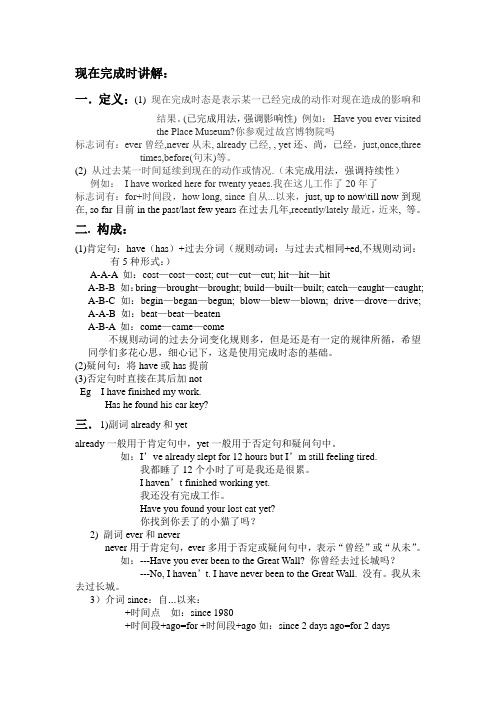
现在完成时讲解:一.定义:(1)现在完成时态是表示某一已经完成的动作对现在造成的影响和结果。
(已完成用法,强调影响性) 例如:Have you ever visitedthe Place Museum?你参观过故宫博物院吗标志词有:ever曾经,never从未, already已经, , yet还、尚,已经,just,once,three times,before(句末)等。
(2)从过去某一时间延续到现在的动作或情况.(未完成用法,强调持续性)例如:I have worked here for twenty yeaes.我在这儿工作了20年了标志词有:for+时间段,how long, since自从...以来,just, up to now\till now到现在, so far目前in the past/last few years在过去几年,recently/lately最近,近来, 等。
二. 构成:(1)肯定句:have(has)+过去分词(规则动词:与过去式相同+ed,不规则动词:有5种形式:)A-A-A 如:cost—cost—cost; cut—cut—cut; hit—hit—hitA-B-B 如:bring—brought—brought; build—built—built; catch—caught—caught;A-B-C 如:begin—began—begun; blow—blew—blown; drive—drove—drive;A-A-B 如:beat—beat—beatenA-B-A 如:come—came—come不规则动词的过去分词变化规则多,但是还是有一定的规律所循,希望同学们多花心思,细心记下,这是使用完成时态的基础。
(2)疑问句:将have或has提前(3)否定句时直接在其后加notEg I have finished my work.Has he found his car key?三.1)副词already和yetalready一般用于肯定句中,yet一般用于否定句和疑问句中。
